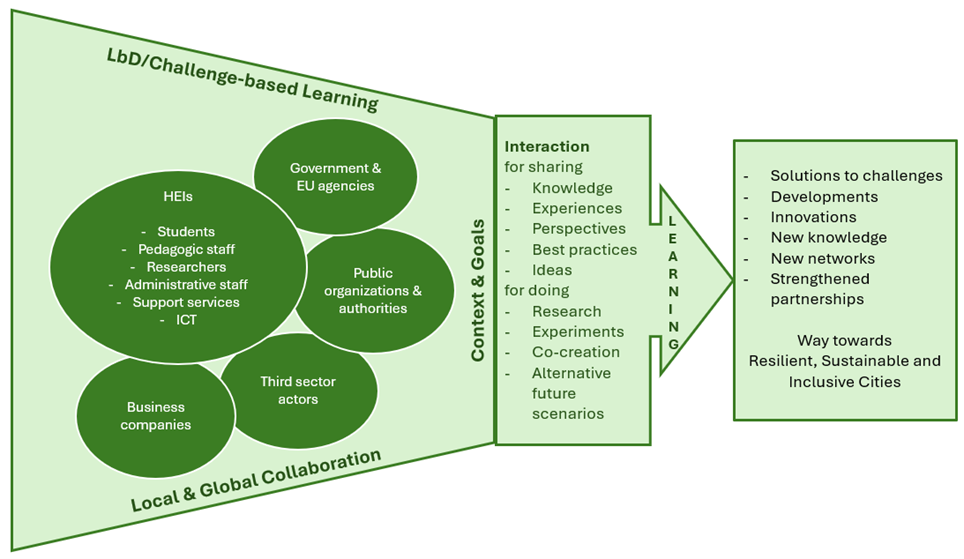The InCITIES project, funded by the European Union in 2022-2025, aims to achieve transformations in universities and their stakeholders, centred around cities’ inclusion, sustainability, and resilience needs. It addresses the current challenges of cities with the focus on widening countries Slovakia and Portugal, allowing them to overcome structural, sociocultural, economic, political, and institutional barriers. In practice, the work package 6, coordinated by Laurea University of Applied Sciences and University of Zilina (Uniza), aimed to improve educational practices in those countries by applying and piloting Learning by Developing (LbD) pedagogical model in local & global learning ecosystems.
 Photo by Ranazain (AI) Adobe Stock (Laurea Education-licence)
Photo by Ranazain (AI) Adobe Stock (Laurea Education-licence)
Multi-voice participation and co-creation in education – a link to sustainable, resilient and inclusive urban development
The LbD pedagogical model was developed especially for the context of universities of applied sciences by Laurea University of Applied Sciences but can be applied extensively to different education and development environments. The key elements of the model are: authentic development assignments, research-based approach, cooperation with different stakeholders and the learner’s active role. The model is well placed at the core of the learning economy thinking: learning takes place in a productive relationship with the surrounding society. In the LbD pilots in Higher Education Institutions (HEIs) Uniza, Slovakia and ISCTE, Portugal, students from InCITIES project partner HEIs participated in the implementations. Both pilots consisted of online studying for several weeks and 1-week onsite learning. Set in mixed teams, the students tackled challenges such as sustainable mobility, energy solutions, circular economy and social sustainability in cities. LbD’s participatory processes enabled the participation of business companies, third sector actors as well as public organizations and authorities in the learning ecosystem. Thus, co-creation did not remain theoretical but took concrete forms: city-context development tasks built bridges between education and a living urban reality. The LbD model served not only as a pedagogical approach, but also as a tool for strengthening the vitality, competitiveness, social fairness and resilience to react to crises of cities. Figure 1 illustrates a simplified model of the LbD pilots.
 Figure 1. Learning in InCITIES LbD pilots
Figure 1. Learning in InCITIES LbD pilots
HEIs lead the way in challenge-based learning within learning ecosystems
The LbD-pilots demonstrated clearly that HEIs can and do lead the way in challenge-based education within learning ecosystems in which learning is continuous, multi-location and diverse. Authentic, multi-actor and research-based development challenges enable HEIs together with their local and global stakeholders to interactively participate in strengthening sustainability, resilience and inclusion. The basic idea is that learning is seen as an investment, not only for the development of the individual, but for the development of society as a whole. The ability to learn is more important than previous knowledge capital — the focus is on resilience, the ability to renew and co-create. The emphasis is on the transition from the governance of education systems to ecosystems where learning also takes place at work, in everyday life and in digital environments. Education is not just the exclusive right of the state, but a multi-actor social contract. The public sector, companies, civil society and learners themselves are working together to build the direction of futures. It refers to lifelong learning strategies, co-creation and shared responsibility. The learning ecosystems and economy may be seen as a solution to the needs of education reform as it has the perspective of the competence economy highlighting not just formal education, but a holistic ecology of knowledge.
The transition to a learning society and a learning economy thinking in education is not only a structural change – it is also an invitation to renew thinking and engage more broadly actors in all sectors of society. The LbD piloting in the city development framework in Slovakia and Portugal paved greatly the way for building a sustainable learning future together.
References
The first image in this article (the feature image) is not licensed under CC BY-SA. It has been used in accordance with the terms of the Adobe Stock Education License and may not be reused or redistributed without separate permission.